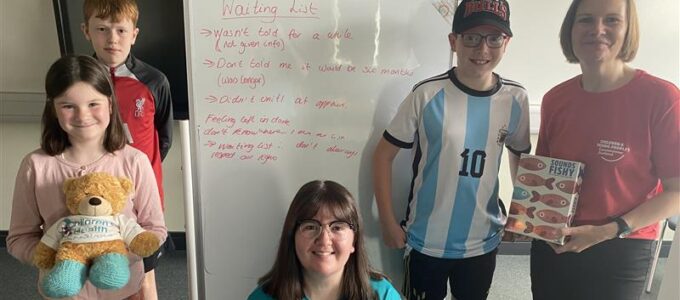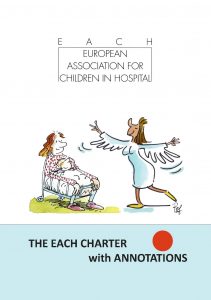
At Children’s Health Scotland, we believe that children and young people should be heard—especially when it comes to their health and wellbeing. That’s why our incredible Health Rights Defenders have been speaking up about something that affects far too many: long waiting times to access healthcare.
Recently, we had the opportunity to meet with Elaine Kerridge from the office of the Children and Young People’s Commissioner Scotland to share these powerful insights and discuss how we can work together to make real change.
Here’s what our Health Rights Defenders had to say:
“I don’t think children should be on waiting lists. It’s a long time to wait and it can make you feel very anxious. It’s hard to understand as a child.”
— Elodie, 9
“Waiting lists don’t really respect our Health Rights. It doesn’t give us information in a way that is easy to understand and stops us from being able to make decisions.”
— Sam, 14
“I think it just needs to be really clear what a waiting list is. When I was on one, I just had to wait and I couldn’t ask questions. One of my rights is to be able to ask questions and make decisions and you can’t do that if you need to wait months.”
— Niamh, 15
“If we do have to have waiting lists, you should only be on one for 1 month and that is all. 1 month is a long time to wait for a child anyway, but what are we supposed to do if we have to wait longer? That’s why SMS is so good—you don’t have a waiting list and someone always checks in on you.”
— Ruaridh, 10
What should be in a waiting list letter if we have to have Waiting Lists?
Our Health Rights Defenders had some brilliant ideas about how to make waiting list letters more helpful and respectful of children’s rights:
- Clear, simple language that explains what a waiting list is and how it works.
- Transparency about how long the wait might be—no more vague “you’ll be seen eventually” messages.
- Information for the child or young person directly, not just the adults.
- A list of resources to support them while they wait—like the SMS Programme, with clear instructions on how to join.
- A trusted adult contact—someone like Rhianne from Children’s Health Scotland—who can be reached by phone or text, 24/7, to answer questions and help make a plan.
- Regular check-ins—every two weeks—to talk about progress and next steps. Because children need a plan, not just a place in line.
And finally, they want the letter to feel friendly and welcoming—not cold and clinical. Think colour, creativity, and even a progress tracker that lets young people see where they are on their journey, like a goal path they can tick off.
Why Listening Matters
Michelle Wilson, our Head of Children and Young People Services says:
Children and young people have the right to be involved in decisions that affect them—including decisions about their healthcare. They also have the right to the best possible health. In Scotland, we need to ask ourselves: do our current waiting times really respect, protect, and fulfil those rights? Listening to young people isn’t just important—it’s essential.
🌟 Are you waiting for support with your health and wellbeing? 🌟
Are you a child or young person (aged 9–17) who’s on a waiting list, or do you know someone who is? Our Self-Management Skills (SMS) Programmes are here to help! They’re for children and young people living with a health condition or concern — and you don’t need a diagnosis to join.
If you’d like to:
- Understand your health and feelings better,
- Learn new ways to cope,
- Make new friends…
